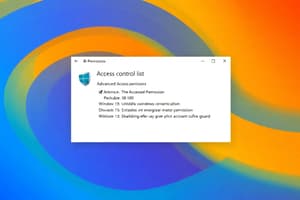Podcast
Questions and Answers
Explain the purpose of an Access Control List (ACL) and how it is applied to a router interface.
Explain the purpose of an Access Control List (ACL) and how it is applied to a router interface.
An ACL is used to filter packets based on information in the packet header. When applied to a router interface, it evaluates network packets passing through to determine if they can be forwarded.
What are access control entries (ACEs) and how are they used in an ACL?
What are access control entries (ACEs) and how are they used in an ACL?
ACEs are permit or deny statements used in ACLs to filter network traffic. When traffic passes through an interface with an ACL, the router compares the packet information against each ACE in sequential order to determine a match.
List five tasks performed by routers that require the use of ACLs.
List five tasks performed by routers that require the use of ACLs.
- Limit network traffic for increased performance 2. Traffic flow control 3. Basic network security 4. Filtering traffic based on type 5. Screening hosts for network service access
What is the purpose of packet filtering in the context of an Access Control List?
What is the purpose of packet filtering in the context of an Access Control List?
Explain the default state of a router in relation to Access Control Lists (ACLs).
Explain the default state of a router in relation to Access Control Lists (ACLs).
Flashcards
What is an ACL?
What is an ACL?
An Access Control List filters packets based on packet header information to determine if they can be forwarded when applied to a router interface.
What are ACEs?
What are ACEs?
Access Control Entries are permit or deny statements within ACLs used to filter network traffic by comparing packet information against each ACE sequentially.
What is packet filtering?
What is packet filtering?
Packet filtering is a way to control network access. It analyzes packets and forwards or discards them based on specified criteria.
Default state of a router regarding ACLs?
Default state of a router regarding ACLs?
Signup and view all the flashcards
Five tasks done by Routers using ACLs
Five tasks done by Routers using ACLs
Signup and view all the flashcards
Study Notes
Access Control Lists (ACLs) and Routers
- An Access Control List (ACL) is a set of rules that filters traffic based on criteria such as source and destination IP addresses, ports, and protocols, to control access to a network or a specific device.
- An ACL is applied to a router interface to control incoming and outgoing traffic, thereby securing the network and preventing unauthorized access.
Access Control Entries (ACEs)
- An Access Control Entry (ACE) is a single entry in an ACL that specifies a set of rules to permit or deny traffic based on specific criteria.
- ACEs are used in an ACL to define a set of rules that are evaluated in a specific order to determine whether to permit or deny traffic.
Tasks that Require ACLs on Routers
- Filtering traffic based on source and destination IP addresses
- Controlling access to specific network services or applications
- Blocking traffic from specific IP addresses or networks
- Permitting traffic from trusted sources
- Implementing quality of service (QoS) policies
Packet Filtering
- Packet filtering is the process of examining packets of data against a set of rules to determine whether to permit or deny them based on specific criteria.
- In the context of an ACL, packet filtering is used to control traffic flowing through a router interface.
Default State of a Router
- By default, a router has no ACLs configured, which means that it allows all traffic to pass through without restriction.
- This default state can pose a security risk, as it allows unauthorized access to the network or device.
Studying That Suits You
Use AI to generate personalized quizzes and flashcards to suit your learning preferences.




